In my childhood years, snacking on salt roasted cashews is common and that’s a long time ago. Hey, what does a child know except eat and enjoy, right? Fast forward, for a few years now, I’ve been receiving jar of roasted cashews in the annual Chinese New Year gift basket. So then, this means cashew nuts is still a popular snack. But how is cashews healthy for you? This you need to know and I have the answer. Not only that, the bad effects of eating cashew nuts you must know. Read on…
What About Cashews
Firstly, let’s take a moment to read what cashew is.
In fact, the cashew nut is botanically classified as a seed because it grows on the cashew apple fruit which belongs to the stone fruits.
In Brazil, the cashew apple is called caju, a Portuguese terminology. And the seed (nut) that’s part of the caju fruit is known as castanha de caju, when translated to English means nut of the cashew fruit. In my home country, Malaysia, cashews are call kacang gajus.
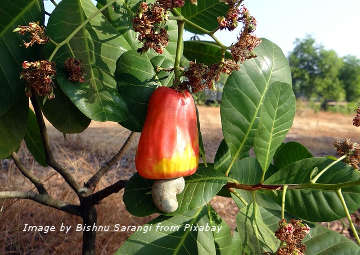
In the world of culinary, cashew is a nut. In cooking, cashews are used similarly to any other nuts and most common in South Asian cuisine either in the whole form or ground.
Although the nut-bearing cashew tree originates from Brazil, nowadays, it is grown around the world particularly in Vietnam, India, Indonesia, the Philippines, Benin and the Ivory Coast.
As of the year 2020, Vietnam is the world’s largest producer and exporter of cashew nuts.
Cashew Nuts Nutrition Facts in Brief
A 1-ounce (28g) serving of raw cashew nuts give you
- Total Fat: 12g => 15% Daily Value* (DV) of which 80% are unsaturated fats
- Total Carbohydrate: 9g => 3% DV
- Protein: 5g => 10% DV
*The Daily Value (DV) percentage tells you how much a nutrient contributes to your daily diet in a serving.
The minerals and vitamins content is quite impressive and they are
- Copper – 69% DV
- Phosphorous – 24% DV
- Magnesium – 21% DV
- Manganese – 20% DV
- Zinc – 15% DV
- Vitamin B6 – 9% DV
- Vitamin K – 8% DV
Health Benefits Eating Cashews
Similar to most nuts and seeds, for instance, walnut, almond and pumpkin seed, cashew may help improve your overall well being.
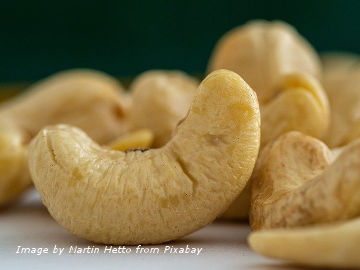
Rich in heart-healthy fats, fibre and a good source of plant protein, let’s find out how your health benefits from eating cashews.
1. Antioxidant for Reducing Inflammation
Cashews contain antioxidants which are important in keeping your body healthy. Antioxidants neutralise damage-causing molecules known as free radicals. As a result, this helps reduce inflammation and enhance your body’s ability to stay healthy.
You ought to know free radicals can damage cells, causing diseases and ageing.
In addition, if you’ve chronic inflammation, your body will respond to it negatively. This is because inflammation is your body’s response to injury and works to heal the wound but in the condition of chronic inflammation, your body may eventually start damaging healthy cells. Hence, leads to various diseases such as cancer and cardiovascular diseases (1).
2. Healthy Fats for Managing Cholesterol & Lead to Healthy Heart
Most of the fats found in cashew nuts are monounsaturated at 6.7g and polyunsaturated at 2.2g in a 28g serving. Unsaturated fats are considered to be a healthier form of fats.
Cholesterol. In a controlled-feeding study, the incorporation of cashews into participants’ diets showed a decrease in total cholesterol and LDL “bad” cholesterol. This result provides the support that the daily consumption of cashews, when substituted for a high-carbohydrate snack, maybe a simple dietary strategy to help manage cholesterol levels.
Healthy heart. What is the connection between cholesterol and heart disease? Well, cholesterol is a fatty substance that travels in your bloodstream in high-density lipoproteins (HDL) and low-density lipoproteins (LDL).
HDL is the “good” cholesterol because it collects cholesterol and takes it back to your liver for excretion.
LDL, very often referred to as the “bad” cholesterol, carries cholesterol to the parts of your body that needs it. Too much cholesterol in your bloodstream is bad for you because it can stick to your artery walls and in the long run, may lead to blockage.
Narrowed or blocked arteries can restrict blood from reaching your heart, brain, or other organs. This can cause stroke, heart attack or heart failure.
In short, high levels of HDL and low levels of LDL help reduce the risk of heart disease.
3. Fibre for Weight & Blood Sugar Control
Generally, nuts are a good source of fibre. In this case, cashews contain a fairly good amount.
Weight loss. Fibre is known to make you feel fuller longer and reduce hunger, both of which help promote weight loss.
On top of that, fibre also helps keep your gut bacteria healthy. Several studies have shown people who consume more soluble fibre have greater varieties of bacteria and better health outcomes (1, 2).
Another study showed that people with a greater variety of gut bacteria have a lower risk of belly fat.
Blood sugar. Fibre helps slow the absorption of sugar preventing blood sugar spikes. This may reduce the risk of developing type 2 diabetes (1).
4. Copper for Healthy Bones, Immune Function & Absorption of Iron
Heavy metal is good for you, yes. Copper is an essential nutrient your body needs to function properly.
Bones. While calcium is an essential mineral for maintaining strong bones, copper has only recently been found to play an important role in bone health maintenance (1).
Osteoporosis, a condition with weak and brittle bones become more common as you age and has been linked to copper deficiency (2).
Immune system. Copper is necessary for the upkeep of a healthy white blood cell count. When you experience a copper deficiency, the production of white blood cells known as neutrophils or neutropenia is reduced (1). Hence, your body’s first line of defence is compromised and affects the ability to combat infection.
Iron Absorption. Copper is essential for absorbing iron (1). When copper levels are low, your body may absorb less iron. This may cause a condition where the body is unable to carry enough oxygen to its tissues. A lack of oxygen can make you feel fatigued more easily and lethargic.
Magnesium for Constipation
Cashews give you 21% daily value of magnesium in a 28g serving. It is a mineral your body needs to keep the organs functioning particularly, the heart, kidney and muscles.
How does magnesium help constipation? In two ways
- Relaxes the muscles in the intestines helping to establish a smoother rhythm.
- Increases the amount of water in the colon thus softening the stools, making them easier to pass.
How to Eat Cashew Nuts
You can easily add cashews to your diet. Simply eat them on their own as a healthy snack just like I did during my childhood years. Hey, I still do – lightly roasted with sea salt.
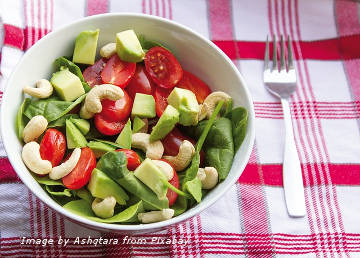
Here are other ways you can enjoy cashews
- Include cashews when making your own healthy trail mix, granola bites or muesli.
- Add to your stir-fry dishes in the last minute of cooking so that you’ll still get the crunchiness and the cashews covered in sauce. Yummy!
- Sprinkle chopped cashews onto salads or you can use the whole form to give you more bites.
Which is Better, Raw or Roasted Cashews
The short answer is both raw and roasted cashews are good for you. This is because they contain similar amounts of protein, calories, carbs and fibre.
However, raw cashews may contain bacteria but it is unlikely to cause an illness. On the other hand, roasted cashews may contain lower antioxidants, vitamins and healthy fats though might not significantly affect the health benefits.
Here is what you can do – when roasting your cashews, keep a low temperature between 120-150°C for not more than 15 minutes. This keeps nutrients loss at a minimum and eliminates bacteria.
The above applies to other snacking nuts such as almonds, walnuts, pecans and hazelnuts.
While I like mine lightly roasted, my husband likes his raw particularly walnut. How about you?
Why are Cashews Bad for You
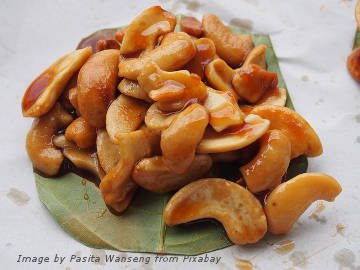
Generally, cashews are a safe addition to your diet but bear in mind that roasted or salted cashews may contain high levels of added oil or salt while others may be sugar-glazed. Worst are those prepacked cashews snacks which may contain preservatives. For these reasons, it is best to go for unsalted dry-roasted ones.
Having said that, as with many foods, eating too much is not good for health and you should always strive for a balanced diet.
One serving of cashews is 28g and you’ll get approximately 18 medium-sized nuts. For this amount, it has 157 calories but that’s not a lot considering it is about 8% of the total daily calories for a typical 2,000-calorie diet.
Nonetheless, you will easily eat more than 18 cashews in one sitting without even realizing it. As a result, you’ll quickly increase your calorie intake and together with other high-calorie food exceed the calorie needs for the day.
This leads to you know what – weight gain, and other conditions such as type 2 diabetes, hypertension, cardiovascular diseases among others.
So, How Many Cashews Can You Eat a Day
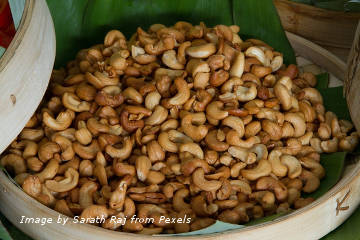
Before you dive your fingers into a jar of cashews, always remember more is usually less.
Though it was mentioned one serving of cashews is about 18 nuts, you should not be eating that many. I’ve read a few articles where nutritionists suggest limiting consumption to not more than 5 cashew nuts per day.
But then, honestly, I can’t stop at 5. How about you? What you and I can do is be mindful at all times listening to our body, feel and respond accordingly. In other words, practise self-care always.
In a Nutshell
Cashews have been a popular snack for a long time and they will continue to be one of the many popular nuts for snacking. Besides the delicious creamy taste and crunchy texture, there are various health benefits eating cashews.
Biologically a seed, cashew is known as a nut and its nutrients are similar to any other nuts, high in protein, healthy fats and rich in fibre. Cashews are a good source of copper, magnesium and phosphorous.
If you have not gotten to know what cashew is plus its health benefits, now is the time to try out this healthy nut. But I have to remind you not to overindulge as too many can add unwanted pounds.
As a snack, you could easily eat more than you realise. This does not mean not to eat them at all. You can include cashews in your diet in a controlled manner by adding a fixed amount to your meals such as stir-fry dishes, salads or soup.
How would you eat your cashews? Tell us in the comments section below. If you have not tried them, will you now? We certainly love to know.
Please share this article with anyone you think may find this information useful. Go on, click the share button!
Now, let’s get started:
For me US readers, shop on Amazon. There are plenty of choices to choose from but do so carefully, buying healthy ones.
Look what I have found for you ↓
For my fellow Malaysians, buy on Shopee or Lazada.
On Shoppe, there is an excellent selection with thousands of customer reviews. But check this out → Dry (no oil) Roasted Salted Cashews.
Should you prefer to buy on Lazada, this is the TOP seller for raw cashews. By roasting your own, you can control the salt content.
Learn more: on me Nuttylog
- What is pumpkin seeds good for
- What health benefits do walnuts have
- What health benefits do almonds have
- How healthy is granola bars
- How healthy is overnight oats
Happy shopping and thanks for reading.
Me YourHealthy Corner – Healthy snacking is possible.
Disclosure: This blog post contains affiliate links as part of the Amazon.com Services LLC Associate Programs and other affiliate services. This means that meyourhealthycorner.com receives a small commission by linking to amazon.com and other sites at no extra cost to the readers.
Medical Disclaimer: I am not a doctor or medical professional, and this post should not be taken as medical advice. Please do your own research. The material on this blog is provided for informational purposes only. It is general information that may not apply to you as an individual and is not a substitute for your own doctor’s medical care or advice.

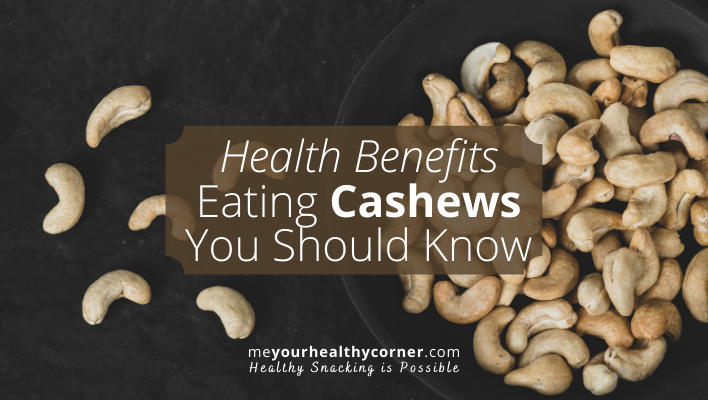



Hi Sharon,
Excellent article. Thank you for sharing it!
I didn’t know that Cashews were so beneficial for health. I have cholesterol, and I am always looking for foods that help reduce the bad cholesterol. Is it matter if Cashews aren’t organic? I ask this because one of my friends buys only organic foods. She says that non-organic food can be very destructive. It doesn’t matter if it’s vegetables, fruits, or grains.
Thank you for this great post!
Hi Daniella,
I understand people’s concerns about non-organic foods.
Those with food allergies or have certain health concerns may benefit from consuming organic foods where crops are grown without the use of synthetic herbicides, pesticides, and fertilizers. However, when it comes to nutrients content, the differences are not significant.
For me, organic foods are not readily available from where I’m at but that’s not stopping me from obtaining the benefits of eating cashews, for example. Furthermore, organic foods are more expensive.
Choose what’s best for you. I say organic or non-organic shouldn’t be the main factor unless it affects you directly. If cashews can help you in managing your cholesterol levels without causing an allergic reaction, organic or non does not matter.
Wish you well.